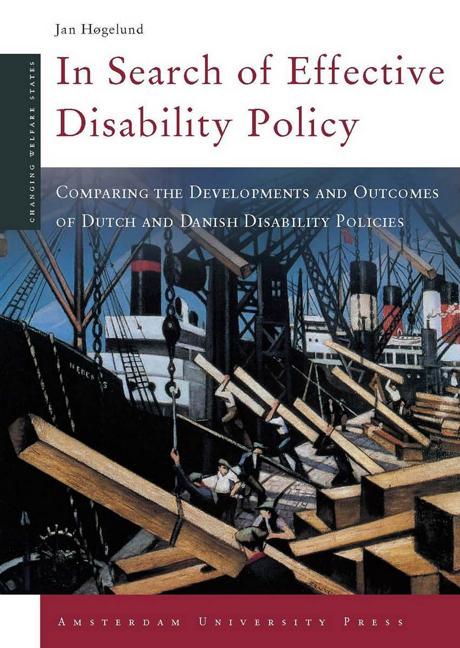 In Search of Effective Disability Policy
In Search of Effective Disability Policy Book contents
- Frontmatter
- Contents
- Acknowledgement
- 1 Disability Policies Under Pressure
- 2 The Integration of Disabled People:What Do We Know?
- 3 Bringing the Pieces Together:A Multidisciplinary Approach to Work Disability
- 4 Economic Miracles Bypassing Disabled People
- 5 Dutch Disability Reforms:Redefining Responsibilities
- 6 Danish Disability Policy:Small Steps,Big Change?
- 7 Different Routes to Integration
- 8 Different Policies – Different Outcomes
- 9 Too Much and Too Little:Employers’Responsibility in Denmark and the Netherlands
- Tables and Figures
- Notes
- References
- Index of Subjects
- Index of Names
6 - Danish Disability Policy:Small Steps,Big Change?
Published online by Cambridge University Press: 15 January 2021
- Frontmatter
- Contents
- Acknowledgement
- 1 Disability Policies Under Pressure
- 2 The Integration of Disabled People:What Do We Know?
- 3 Bringing the Pieces Together:A Multidisciplinary Approach to Work Disability
- 4 Economic Miracles Bypassing Disabled People
- 5 Dutch Disability Reforms:Redefining Responsibilities
- 6 Danish Disability Policy:Small Steps,Big Change?
- 7 Different Routes to Integration
- 8 Different Policies – Different Outcomes
- 9 Too Much and Too Little:Employers’Responsibility in Denmark and the Netherlands
- Tables and Figures
- Notes
- References
- Index of Subjects
- Index of Names
Summary
In contrast to the Netherlands, Denmark has never been involved in a direct fight against disability problems. The development in the number of disability beneficiaries has evolved much more slowly than in the Netherlands (see Chapter 4), which is probably the reason why disability problems has not been a contested issue in the political landscape. Danish disability policy has instead developed in the wake of efforts to limit public expenditure and later in the 1990s in the wake of the general discourse of an active labour market policy. The development has not involved radical reforms, but a series of adjustments that cultivated the existing policy, where public authorities are almost entirely responsible for the financing, administration and implementation of the disability policy.
This chapter provides an outline of the Danish disability policy and how it has developed over the last two decades. The chapter concludes with a comparison of the principles on which the Dutch and Danish disability policies rest. I argue that a very important difference concerns the emphasis they put on different actors; in Denmark the responsibility for the disability policy rests to a large degree with the public sector, whereas in the Netherlands this responsibility has been delegated to the individual employer. As a consequence, actors in Denmark and the Netherlands face very different constraints and opportunities, giving them very different incentives both in respect of the work retention of sick-listed workers and integrating non-employed disabled people.
Danish disability policy in the 1980s
With the social reform between 1972 and 1976 the responsibility for the Danish social policy was to a large extent delegated from the state to the local level, in the shape of 14 counties and 275municipalities. The reform was based on the notion of a one-string system: in the case of a social contingency the individual would only have to address himself or herself in one place, the municipality (Andersen, 1971). A municipal worker would then handle the case, be it a question of social assistance, sickness benefit, disability benefit or vocational rehabilitation. Benefits paid by the municipality were in varying degrees refunded by the state.
- Type
- Chapter
- Information
- In Search of Effective Disability PolicyComparing the Developments and Outcomes of the Dutch and Danish Disability Policies, pp. 93 - 110Publisher: Amsterdam University PressPrint publication year: 2003


